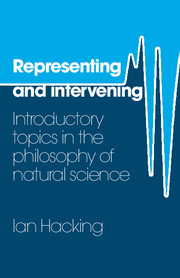Book contents
- Frontmatter
- Acknowledgements
- Contents
- Analytical table of contents
- Preface
- Introduction: Rationality
- Part A Representing
- Part B Intervening
- 9 Experiment
- 10 Observation
- 11 Microscopes
- 12 Speculation, calculation, models, approximations
- 13 The creation of phenomena
- 14 Measurement
- 15 Baconian topics
- 16 Experimentation and scientific realism
- Further reading
- Index
- Frontmatter
- Acknowledgements
- Contents
- Analytical table of contents
- Preface
- Introduction: Rationality
- Part A Representing
- Part B Intervening
- 9 Experiment
- 10 Observation
- 11 Microscopes
- 12 Speculation, calculation, models, approximations
- 13 The creation of phenomena
- 14 Measurement
- 15 Baconian topics
- 16 Experimentation and scientific realism
- Further reading
- Index
Summary
We seem always to have measured. Were not Babylonian surveyors the precursors of geometry? Planetary observations, accurate to many places of sexagesimals, can be traced far back into the ancient world. Historians once said that Galileo was more a Platonist who did things in his head than an experimenter who did things with his hands, but they have since recovered some of his precise numerical observations of the acceleration of bodies on an inclined plane. We noticed Herschel spending a year of his mature life endlessly measuring reflections, refractions, degrees of transmissions of light or radiant heat. Hall's detection of the transverse electric potential required sensitive measurements of current. Measurements connected with Bragg's X-ray diffractions began the trip to molecular biology.
Since measurement is so obviously a part of scientific life, a little iconoclasm will do no harm. Did measurement always have its present role in physical science? Do we well understand the point of the most precise, delicate, and admired measurements in history? Is measurement an inherent part of the scientific mind, or does it stand for a philosophical position? Do measurements measure anything real in nature, or are they chiefly an artifact of the way in which we theorize?
Oddities
My most preposterous worry began when looking at a postcard in the Oxford History of Science Museum. It is a copy of a sixteenth-century painting called The Measurers.
Information
- Type
- Chapter
- Information
- Representing and InterveningIntroductory Topics in the Philosophy of Natural Science, pp. 233 - 245Publisher: Cambridge University PressPrint publication year: 1983
Accessibility standard: Unknown
Why this information is here
This section outlines the accessibility features of this content - including support for screen readers, full keyboard navigation and high-contrast display options. This may not be relevant for you.Accessibility Information
- 1
- Cited by
